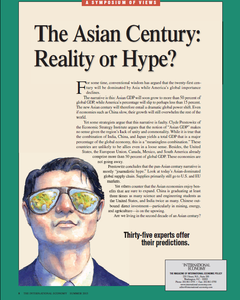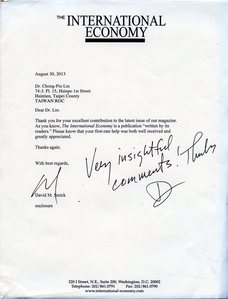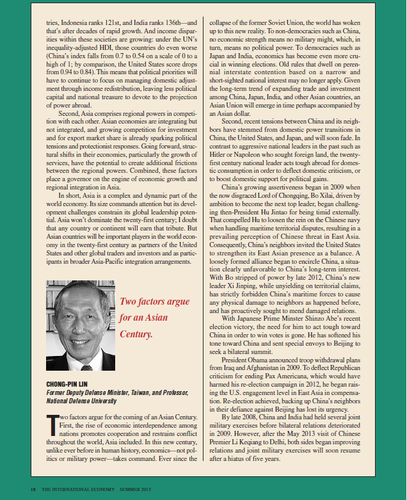Chong-Pin Lin, "Two Factors Argue for an Asian Century" International Economy Summer 2013,p.18



International Economy Summer 2013 pp.8 &18
The Asian Century: Reality Or Hype?
For some time, conventional wisdom has argued that the twenty-first century will be dominated by Asia while America’s global importance declines.
The narrative is this: Asian GDP will soon grow to more than 50 percent of global GDP, while America’s percentage will slip to perhaps less than 15 percent. The new Asian century will therefore entail a dramatic global power shift. Even if economies such as China slow, their growth will still overwhelm the rest of the world.
Yet some strategists argue that this narrative is faulty. Clyde Prestowitz of the Economic Strategy Institute argues that the notion of “Asian GDP” makes no sense given the region’s lack of unity and commonality. While it is true that the combination of India, China, and Japan yields a total GDP that is a major percentage of the global economy, this is a “meaningless combination.” These countries are unlikely to be allies even in a loose sense. Besides, the United States, the European Union, Canada, Mexico, and South America already comprise more than 50 percent of global GDP. These economies are not going away.
Prestowitz concludes that the pan-Asian century narrative is mostly “journalistic hype.” Look at today’s Asian-dominated global supply chain. Supplies primarily still go to U.S. and EU markets.
Yet others counter that the Asian economies enjoy benefits that are sure to expand. China is graduating at least three times as many science and engineering students as the United States, and India twice as many. Chinese outbound direct investment—particularly in mining, energy, and agriculture—is on the upswing.
Are we living in the second decade of an Asian century?
Two Factors Argue for an Asian Century?
Chong-Pin Lin Former Deputy Defense Minister, and Professor, National Defense University
Two factors argue for the coming of an Asian century:
International Economy Summer 2013 pp.8 &18
The Asian Century: Reality Or Hype?
For some time, conventional wisdom has argued that the twenty-first century will be dominated by Asia while America’s global importance declines.
The narrative is this: Asian GDP will soon grow to more than 50 percent of global GDP, while America’s percentage will slip to perhaps less than 15 percent. The new Asian century will therefore entail a dramatic global power shift. Even if economies such as China slow, their growth will still overwhelm the rest of the world.
Yet some strategists argue that this narrative is faulty. Clyde Prestowitz of the Economic Strategy Institute argues that the notion of “Asian GDP” makes no sense given the region’s lack of unity and commonality. While it is true that the combination of India, China, and Japan yields a total GDP that is a major percentage of the global economy, this is a “meaningless combination.” These countries are unlikely to be allies even in a loose sense. Besides, the United States, the European Union, Canada, Mexico, and South America already comprise more than 50 percent of global GDP. These economies are not going away.
Prestowitz concludes that the pan-Asian century narrative is mostly “journalistic hype.” Look at today’s Asian-dominated global supply chain. Supplies primarily still go to U.S. and EU markets.
Yet others counter that the Asian economies enjoy benefits that are sure to expand. China is graduating at least three times as many science and engineering students as the United States, and India twice as many. Chinese outbound direct investment—particularly in mining, energy, and agriculture—is on the upswing.
Are we living in the second decade of an Asian century?
Chong-Pin Lin Former Deputy Defense Minister, and Professor, National Defense University
First, the rise of economic interdependence among nations promotes cooperation and restrains conflict throughout the world, Asia included. In this new century—unlike ever before in human history, economy – not politics or military power -- takes command. Ever since the collapse of the former Soviet Union, the world has wakened up to this new reality. To non-democracies such as China, no economic strength means no military might, which, in turns, means no political power. To democracies – such as Japan and India, economy has become even more crucial in winning elections. Old rules that dwell on perennial interstate contention based on a narrow and short-sighted national interest may no longer apply. Given the long-term trend of expanding trade and investment among China, Japan, India and other Asian countries, an Asian Union will emerge in time perhaps accompanied by an Asian dollar.
Second, recent tensions between China and its neighbors have stemmed from domestic power transitions in China, the U.S., and Japan and will soon fade. In contrast to aggressive national leaders in the past such as Hitler or Napoleon who sought foreign land, the 21st century national leader acts tough abroad for domestic consumptions: to deflect domestic criticism, or to boost domestic support for political gains.
China’s growing assertiveness began in 2009 when the now disgraced Lord of Chongqing Bo Xilai, driven by ambition to become the next top leader, began challenging the then President Hu Jintao for being timid externally. That compelled Hu to loosen the rein on the Chinese navy when handling maritime territorial disputes, resulting in a prevailing perception of China threat in East Asia. Consequently, China’s neighbors invited the U.S. to strengthen its East Asian presence as a balance. A loosely formed alliance began to encircle China, a situation clearly unfavorable to China’s long-term interest. With Bo stripped of power by late 2012, China’s new leader Xi Jinping, while unyielding on territorial claims, has strictly forbidden China’s maritime forces to cause any physical damage to neighbors as happened before and has proactively sought to mend damaged relations.
With Japanese Prime Minster Shinzo Abe’s recent election victory, the need for him to act tough toward China in order to win votes is gone. He has softened his tone toward China and sent special envoys to Beijing to seek a bilateral summit.
President Obama announced troop withdrawal plans from Iraq and Afghanistan in 2009. To deflect the Republican’s criticism of him for ending Pax Americana which would harm his re-election campaign in 2012, he began raising the U.S. engagement in East Asia for compensation. Now, with his re-election achieved, backing up China’s neighbors in their defiance against Beijing has lost its urgency.
By late 2008, China and India had held several joint military exercises before bilateral relations deteriorated in 2009. However, after the May 2013 visit of Chinese Premier Li Keqiang in Dehli, both sides began improving relations and joint military exercises would soon resume after a hiatus of five years.


 留言列表
留言列表


